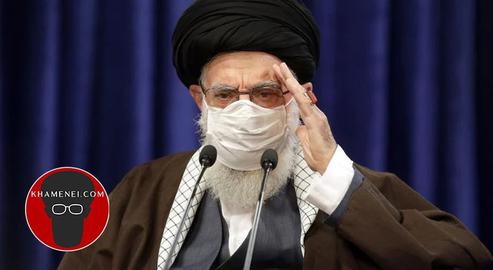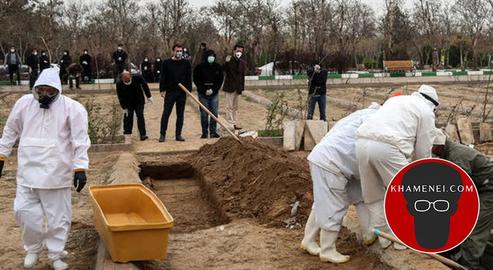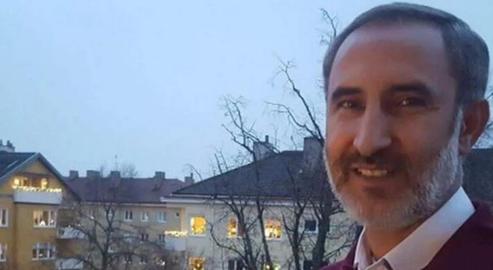Iranians have been comparing deaths from Covid-19 in their country to the falling of leaves in autumn. Mourning families stand in line for hours to see their loved ones buried, while desperate Iranians all over the country stand in queues of another kind waiting for vaccines at clinics that are woefully out of stock. Amid a devastating fifth wave of coronavirus and the same hapless “management” as was seen throughout 2020, many have posted videos of themselves online, weeping and cursing one person in particular: Iran’s Supreme Leader Ali Khamenei. A lot of Iranians directly blame Khamenei for the present disaster because in early January, he explicitly banned imports of American and British-made vaccines.
As even the untrustworthy official figures for coronavirus cases and deaths continue to rise exponentially, a number of prominent lawyers and civil rights activists were detained last week as they prepared to file a lawsuit against the Iranian government for failings during the coronavirus pandemic, and against Khamenei for his ban on importing vaccines. At the same time, in a letter to the UN, the Defenders of Human Rights Center accused Khamenei of being directly responsible for the “Covid-19 massacre” in Iran.
***
It was the winter of 2020 when the coronavirus pandemic first hit Iran. For ideological and economic reasons, quarantines were not imposed for weeks, nor were restrictions on inter-city travel imposed. On the contrary; the government sought to stifle reports of Covid-19 cases and actively encouraged people to go out to vote and take part in parades for the anniversary of the revolution.
Even when restrictions were announced, far too late, they were implemented so ineptly that more and more people lost their lives to Covid-19. The first vaccines, Pfizer and Moderna, came from the US and, little by little, other countries developed other vaccines, with AstraZeneca – jointly produced by British and German scientists – the next to receive the WHO’s stamp of approval. But then in January, Ali Khamenei slapped a ban on Iran using vaccines made by the UK or US, shocking even some in his inner circle.
Following the Supreme Leader’s speech, a spokesman for Iran’s Red Crescent Society announced that the import of 150,000 doses of Pfizer, which had come from charitable donations, had been canceled. Then in an open letter to President Rouhani on January 12, 2,500 doctors and academicians advised that besides American, British and French vaccines, the government shouldn’t buy some of the vaccines offered on the Covax initiative.
Suddenly the Islamic Republic announced it was developing its own vaccines. No information about the results of clinical trials conducted on CovIran-Barekat or other Iranian brands has been published, and none of them have been approved by the WHO. Khamenei’s lethal lack of foresight was compounded by the haplessness of Rouhani’s health minister Saeed Namaki, who issued a stream of contradictory statements throughout the pandemic that confused people and medical practitioners alike.
Lying to Students
The mismanagement of the pandemic has, of course, not become part of the official record. Recently a passage was added to the official social sciences textbook for 9th graders in Iran: “With access to advanced medical and treatment facilities and equipment, and to expert, caring and hardworking medical staff, the Islamic Republic of Iran managed to become one of the better countries in handling the coronavirus pandemic, whereas in some Western countries they even refused to admit and treat elderly patients.”
On August 16, the official daily number of Covid-19 fatalities rose to 655. The official death toll has now surpassed 100,000 and is believed to be several times below the actual figure due to a combination of low testing rates and deliberate obfuscation of the data. Also last Monday, the Iranian Defenders of Human Rights Center (DHRC), co-founded by the Peace Prize laureate Shirin Ebadi, sent a letter to Tlaleng Mofokeng, UN Special Rapporteur on the Right to Physical and Mental Health, informing the UN of “the sad and regrettable health situation” in Iran and asking her to hold the Iranian government accountable for negligence.
The letter stated that the increase in the number of Covid-19 fatalities in Iran was result of the Islamic Republic’s ideological stance, which itself is based on the orders and the statements of its Supreme Leader.
Two days earlier, on August 14, the security forces of the Islamic Republic had arrested the six lawyers and civil rights activists in Tehran: Arash Keykhosravi, Mehdi Mahmoudian, Mostafa Nili, Leila Heydari, Mohammad Reza Faghihi and Maryam Afrafaraz. Their phones and personal belongings were confiscated without a warrant. Leila Heydari was released the next day but the situation of other would-be plaintiffs remains unknown. The Center for Human Rights in Iran (CHRI) called the arrest of lawyers and activists a violation of Article 34 of the Constitution, which states it is an “indisputable right of every citizen” to “seek justice by recourse to the competent courts”. This includes bringing a complaint against any official, including, in principle, Ali Khamenei. In a video published by IranWire in August, civil rights attorney Mohammad Olyaeifard also emphasized that bringing complaints against Islamic Republic officials was the legal right of any Iranian citizen.
Has the US Changed?
On August 17, one day after the letter was sent to the UN, the Defenders of Human Rights Center held a Clubhouse chatroom under the unapologetic title “Khamenei’s role in slaughtering the people”. Those in attendance included Shirin Ebadi, Narges Mohammadi and a group of political activists and unionists.
Narges Mohammadi briefly reviewed events after the outbreak of coronavirus in Iran and then addressed Khamenei directly. Regarding his recent apparent U-turn on British and American-made vaccines, she said: “The Supreme Leader of the Islamic Republic must tell us: What have been the consequences of his order [to ban vaccines] for the Iranian people over the past eight months? How much money has this order made for [Iranian] businessmen at the cost of people’s lives? What were the effects of this order on decisions made by other officials? Does Khamenei believe that the nature of the US has changed during this time? Where did his permission [to import vaccines] come from?”
One of the other speakers was Mohammad Habibi, a member of the Iranian Teachers Association, who pointed out that no fewer than 20 unions had objected to the ban on importing US and UK-made vaccines. He asserted that, as a result of the regime’s indifference to these objections and overall “incompetence”, Iran had now arrived at a stage akin to “systematic massacre”.
At the same time, he said, Iranian institutions had been able to push back harder against the ban it might not have remained in place for the best part of eight months. “If at the time that Khamenei ordered the ban, the call for acquiring vaccines had spread more widely in across civil organizations, and if doctors, nurses and others had joined the call, the Supreme Leader might have had no choice but to retreat... International organizations must also get into the act to end the coronavirus crisis.”
Taghi Rahmani, a journalist and political activist, said it was not enough for lawyers and human rights activists to bring a complaint against Iranian officials. Other citizens needed to join them as well. “Ali Khamenei lacks self-confidence and is suspicious of the power structure,” he said. “These suspicions make him weak. This lack of self-confidence is rooted in a kind of feudalism; he’s angry at his serfs. But the people have a right to life, and when their lives are endangered, they have the right to bring a complaint against him. Even if the Islamic Republic resisted as much as possible, it would eventually have to retreat under pressure from public opinion and the international institutions. It’s not necessary for everybody to stand on the frontlines. But it is necessary for there to be synergy over this.”
Demand Answers Loudly
Award-winning filmmaker Mohammad Rasoulof was also among the speakers at the Clubhouse event. When asked by Asieh Amini, the moderator of the chatroom, about the position of the filmmaking community on the issue, he said: “The regime strictly controls and regulates the arts, and especially cinema.
“But we don’t have to prove the egocentric and patriarchal position of the Supreme Leader in the coronavirus massacre. His role is quite clear. The problem is us: those of us who remain silent and passive. We must critique ourselves as much as we critique the system. Unfortunately, we cannot expect this in Iranian cinema because the requirements of making a living in film often drives people to avoid telling the truth.
“People are living in fear. But we have to express our demands loudly and insist on answers.”
Ahmad Reza Haeri, a political activist, discussed the issue of accountability from a religious perspective. Khamenei, he said, believes he is “God’s partner” and “these activists were arrested because they intended to question the management capabilities of this gentleman.”
Haeri added that that it was not yet clear who had arrested Mehdi Mahmoudian and the lawyers, nor on what charges. But, he said, “as far as I know... by bringing a complaint against the Supreme Leader, they expected to weaken him and lay the groundwork for bringing down the regime.”
The “Second Iran-Iraq War”
Dr. Siroos Mirzaei, spokesman of the medical division of Amnesty International Austria, said the international community and especially Doctors Without Borders (MSF) were ready and willing to offer help to Iran – but the request must come from the Islamic Republic first. “Iran could have taken correct measures but [the regime] is both incompetent and a crisis-maker,” he said. “I’ve referred to this situation ‘the second Iran-Iraq war’. Khamenei’s order led to the deterioration of emergency care. The number of patients grew. And today medical staff are at a dead end; they cannot see a way out. The disaster in hospitals will not end in the coming weeks through the importation of vaccines. We need help from abroad.”
Mohammad Nourizad, a filmmaker and former journalist, pointed to the 1988 mass executions and the state-sponsored shootings of civilian protesters in 2017 and November 2019, saying Khamenei must not be held accountable not only for the coronavirus crisis but for all these losses of human life as well. “Throughout these 42 years, we have been content to coexist with massacres and injustice. We never stood up because we have been afraid for our lives; we’ve constantly lived under an acid rain of fear.”
Esmail Bakhshi, a representative of the Haft-Tappeh Sugar Refinery workers’ collective, also said the scope of legal action ought to be expanded. “Society has now broken up into two camps: the regime and the people,” he said. “Last year people were shouting that coronavirus was here, but the regime, on its TV and radio channels, shouted back that there was no coronavirus. Every one of those who lied, from Rouhani’s inept and incompetent minister to everybody else, must be put on trial. They are more significant because the Supreme Leader says something but it is they who spread it in the society.”
The Pandemic as a Political Issue
Majid Tavakoli, a student and human rights activist, pointed out of the Iranian state that it was motivated by money and ideology over public health: “The government acts only when its ‘insiders’ are in harm’s way. If they have now decided that they must stand against coronavirus it is because it’s harming everybody.”
Civil rights lawyer Saeid Dehghan emphasized again that lodging a civil claim against regime officials, including Ali Khamenei, was the right of any citizen. He also pointed out that regardless of intent Khamenei could also be criminally liable for manslaughter, and criticized the Iranian legal community for not taking a collective stance on issues like this.
Bahareh Hedayat, a women rights activist, said that what all the speakers had in common was their consensus on Iran being subject to “tyranny”: “When we say ‘tyranny’ we’re saying that part of the regime is outside the rule of law. If earlier we could not point to Khamenei and the regime as the main proponents of this tyranny, we now can because of coronavirus. In my view, bringing this complaint is not enough. The whole regime is responsible for this mass killing. In a tyranny, one person is the source of power and takes despotic decisions – this then gives way to a hierarchy of followers and supporters. The power flows from him within the tyrannical system.”
She also emphasized the need for supporting the detained lawyers and Mehdi Mahmoudian, saying they were also expressing the feelings of an important segment of Iranian society that – up until now – might not have experienced this tyranny first hand, or to such a lethal degree.
Shirin Ebadi ended the chatroom by pointing out that Covid-19 deaths in Iran had now surpassed those recorded in the Iran-Iraq war. Filing a complaint against Khamenei, she said, was mostly a symbolic gesture: “Do you think we’re so optimistic as to believe a judiciary whose chief is appointed by the Supreme Leader will bring us justice? No! But it starts a discourse. What our colleagues is valuable in itself. The public will see that, yes, one can sue the Supreme Leader even if it gets nowhere. So unlock your lips and demand you rights. Nobody will give you your rights if you don’t ask for them.”
Related Coverage:
Lawyers Arrested for Trying to Sue Iranian State Over Covid-19
The Supreme Leader is Criminally Liable for Iran’s Vaccine Crisis
Khamenei Changes Position on Covid-19 Vaccines
Tehran's Covid Tsar Speaks Out on Vaccine Disaster
Fact Check: Are Vaccines Part of America and Britain’s Devious Plans?
Khamenei's Lie and Other Vaccine Myths Iranians Can Safely Ignore
Iran’s Minister of Health: We’ll Soon Be One of Three Top Exporters of Vaccines in the World
Khamenei Risks the Lives of Iranians by Banning American and British Vaccines
visit the accountability section
In this section of Iran Wire, you can contact the officials and launch your campaign for various problems



























comments